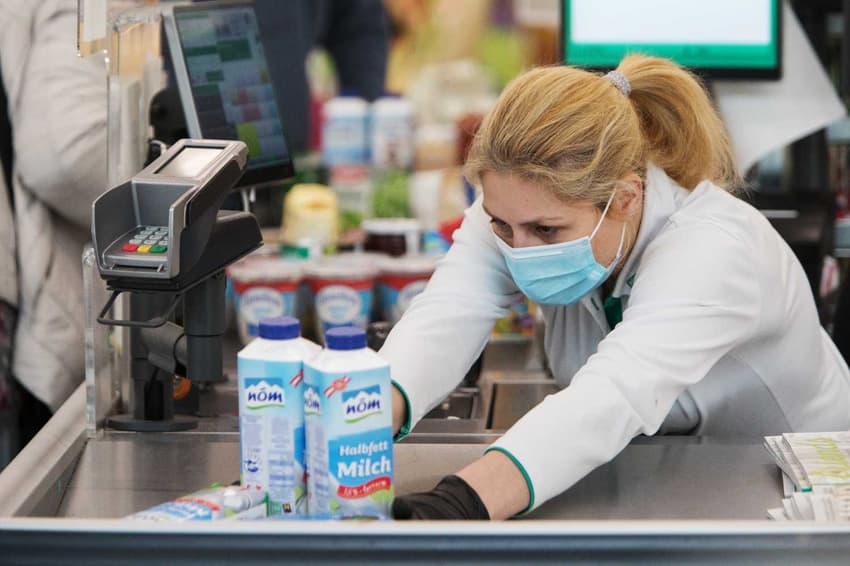Why Austrian supermarkets must reduce their range during lockdown

Supermarkets are considered essential under Austria’s lockdown rules. So why are they selling fewer types of items than pre-lockdown?
Austria’s lockdown came into force on Tuesday, November 17th, closing shops and services across the county.
Supermarkets, pharmacies, post offices, banks and bicycle stores were some of the few outlets allowed to remain open.
Each of these outlets have been considered to be “essential” and thereby must remain open.
Coronavirus: Did Austria fail to take the second wave seriously?
However, many of Austria’s major supermarkets are now no longer selling electronic items, toys, flowers, garden tools, candles and a range of other products.
In fact, if they do elect to sell any of these items, the individual outlets each risk a €3600 fine.
The reason for the restriction comes down to the stores which have been forced to close as a result of the pandemic.
Banner ad
Retailers forced to close for not being “essential” have complained that supermarkets receive an undue advantage as they can sell many of the products deemed not to be “essential” by the government.
As a result, supermarkets have been threatened with lawsuits and need to restrict their offerings only to essential items.
"We appeal to the solidarity of all to buy only those products in the coming weeks that are absolutely necessary for daily use," said the Ministry of Economic Affairs.
One of Austria’s largest retailers, Rewe, welcomed the change.
“We don't want to make sales on the back of the dealers who have to close again in the second lockdown,” Rewe boss Marcel Haraszti told Kronen Zeitung.
The Rewe group, which includes Merkur, Billa, Penny and Adeg, have taken a range of non-essential items like toys, candles and electronics off the shelves.
The government has not provided a set definition of what supermarkets can sell and what they cannot - other than saying the range should be restricted to “typical food retail products” reports the Kronen Zeitung.
This has led other retailers such as Interspar, Hofer and Lidl to continue to sell a range of potentially prohibited products such as school and office supplies.
Austrians hit the shops on Monday after the announcement was made, leading to criticism.
One shoe chain made a public apology after a 'pre-lockdown' sale led to large crowds.
Comments
See Also
Austria’s lockdown came into force on Tuesday, November 17th, closing shops and services across the county.
Supermarkets, pharmacies, post offices, banks and bicycle stores were some of the few outlets allowed to remain open.
Each of these outlets have been considered to be “essential” and thereby must remain open.
Coronavirus: Did Austria fail to take the second wave seriously?
However, many of Austria’s major supermarkets are now no longer selling electronic items, toys, flowers, garden tools, candles and a range of other products.
In fact, if they do elect to sell any of these items, the individual outlets each risk a €3600 fine.
The reason for the restriction comes down to the stores which have been forced to close as a result of the pandemic.
Banner ad
Retailers forced to close for not being “essential” have complained that supermarkets receive an undue advantage as they can sell many of the products deemed not to be “essential” by the government.
As a result, supermarkets have been threatened with lawsuits and need to restrict their offerings only to essential items.
"We appeal to the solidarity of all to buy only those products in the coming weeks that are absolutely necessary for daily use," said the Ministry of Economic Affairs.
One of Austria’s largest retailers, Rewe, welcomed the change.
“We don't want to make sales on the back of the dealers who have to close again in the second lockdown,” Rewe boss Marcel Haraszti told Kronen Zeitung.
The Rewe group, which includes Merkur, Billa, Penny and Adeg, have taken a range of non-essential items like toys, candles and electronics off the shelves.
The government has not provided a set definition of what supermarkets can sell and what they cannot - other than saying the range should be restricted to “typical food retail products” reports the Kronen Zeitung.
This has led other retailers such as Interspar, Hofer and Lidl to continue to sell a range of potentially prohibited products such as school and office supplies.
Austrians hit the shops on Monday after the announcement was made, leading to criticism.
One shoe chain made a public apology after a 'pre-lockdown' sale led to large crowds.
Join the conversation in our comments section below. Share your own views and experience and if you have a question or suggestion for our journalists then email us at [email protected].
Please keep comments civil, constructive and on topic – and make sure to read our terms of use before getting involved.
Please log in here to leave a comment.